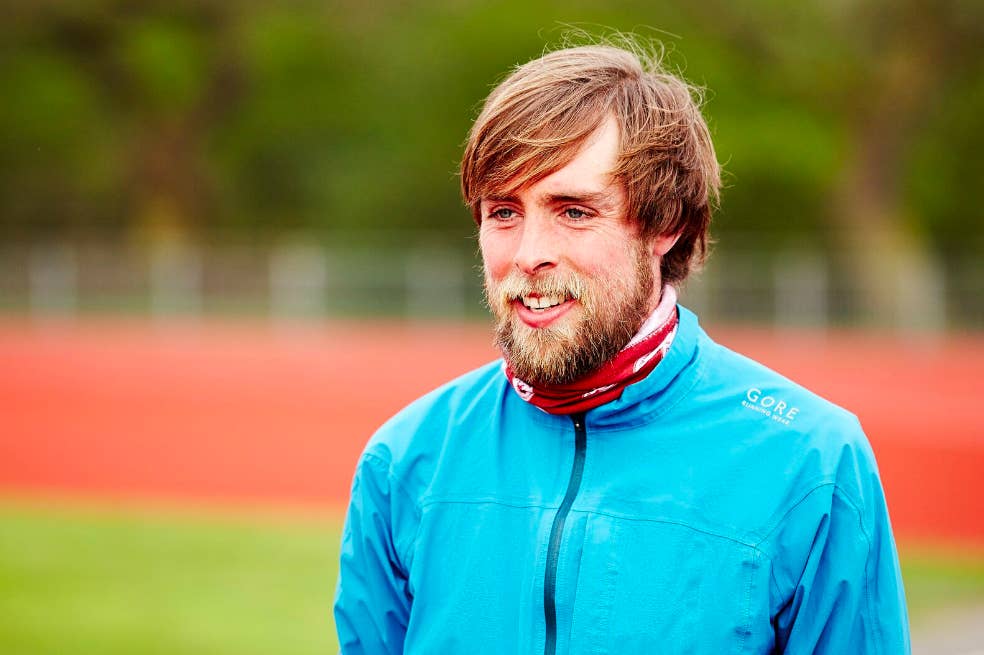
Ben Smith was standing in front of an auditorium of students giving a talk about why he was attempting what no one had done before – to run 401 marathons in 401 days – when he finally broke; when all that had been buried suddenly surfaced.
"I was getting highly personal about my experiences and it got to the point where I was talking about taking a knife to my wrist and…” He looks up, as if trying to find an explanation from above. “…I didn’t realise it was all still in there, and I don’t know if it was because of the emotion of the project coming to an end, but I had to say, ‘I’m really sorry but I need to take a moment.’ And I just stood there in front of all these people trying not to cry,” he says, readjusting the scarf round his head. “I needed to compose myself so I could carry on.”
That moment of steeling himself reveals much about Smith, 33: After depression, a nervous breakdown, two suicide attempts, a childhood crushed by bullying and 20 years in the closet, at 30 he finally stopped; he needed to breathe, to come out, and find something – anything – to enable him to carry on living. He found running.
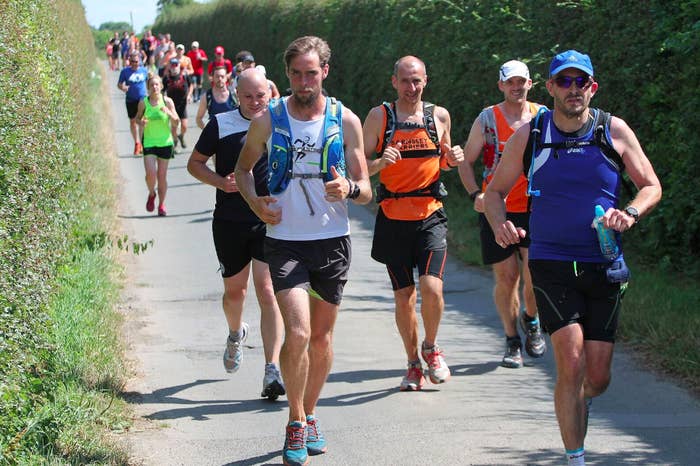
We are talking over Skype two days before he completes the unthinkable: a marathon every day, criss-crossing Britain for well over a year, to raise awareness of bullying as well as £250,000 for two charities, Kidscape and Stonewall, that work to combat homophobic, biphobic, and transphobic bullying. While attempting this historic feat, which he calls The 401 Challenge, he visited over a hundred schools to talk about mental health, sexuality, and how playground violence drove him to the edge.
“We’ve had some schools approach us which have said, 'We want you to come in but we don’t want you to talk about sexuality or suicide,'” he says. “But we’ve turned them down because we’re about openness and honesty.”
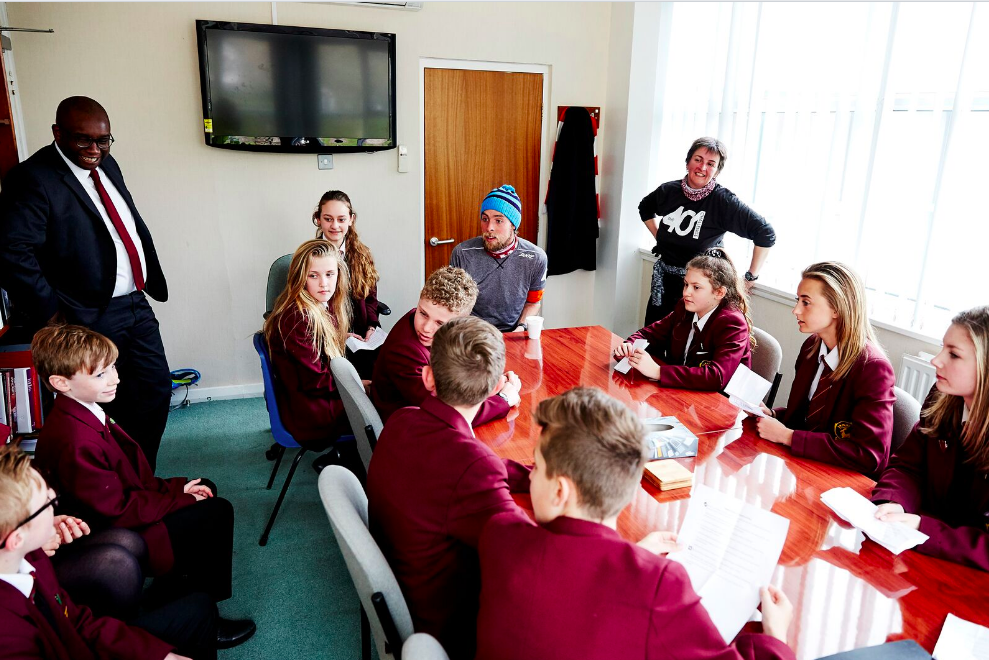
The closest anyone had come to this Herculean task before is 365 marathons in as many days. To beat this record, Smith was originally going to aim for 400 before being persuaded that an extra one could be a victory lap, bringing together all who had helped him. But to finish meant pushing his body to such extremes that even his doctors do not know what it will have done to him.
Smith has lost 6 stone (38kg). His body fat is now just 9%. He has worn out 22 pairs of running shoes. He’s suffered severe tendonitis, he says, lost the feeling in his left foot, broken a big toe, and seen one of his knees double in size. He aches.
But as he ran he was enduring something more extraordinary – a grim impediment that none of the television cameras following him picked up. Before he reveals what this is, the question that screams out is: Why are you putting yourself through this? Many people are bullied at school, all but destroyed by playground homophobes, and many stay in the closet for decades, bound by the chorus of hatred. What is it about Smith that led him to this?
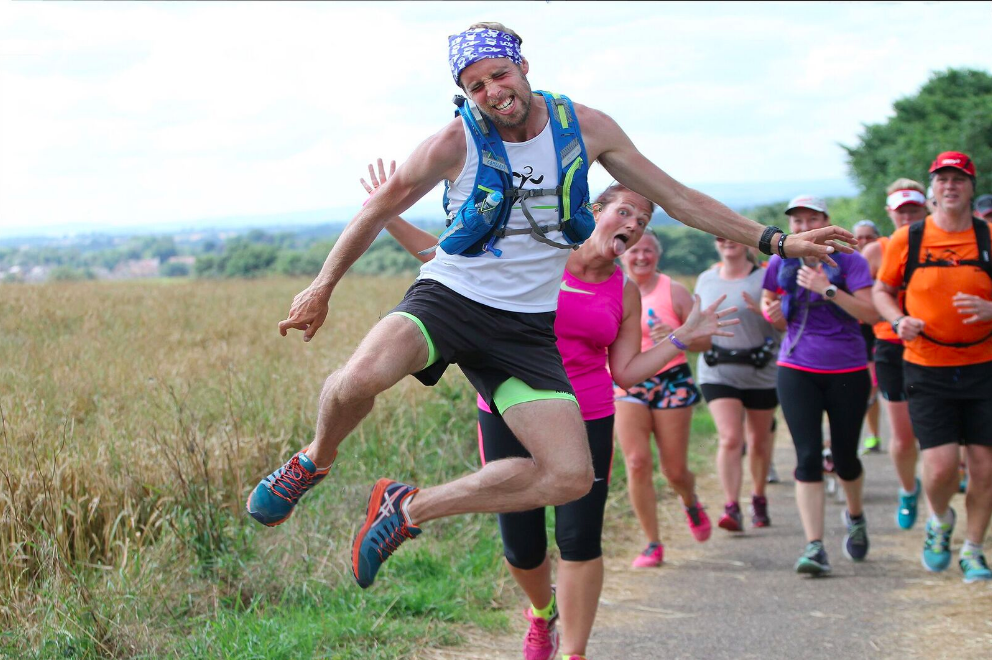
“I think I’ve worked it out,” he says quickly, perched in the empty flat in Bristol he has just moved into with his boyfriend, Kyle.
“I was a corporate monkey before this, working 60-70 hours a week, thinking that you need the car, the house, the great job, the pension to be successful, but I wasn’t happy." Both Smith and Kyle gave up their jobs for this challenge; Kyle, who also gave up his PhD to help, managed the entire operation.
“I knew I was gay," Smith says, "but because I’d gone through school being bullied about it I felt it was wrong. I was told it was wrong.” The bullying began when he was 10, when his parents sent him to boarding school to avoid disrupting his schooling while his father, who was in the army, was stationed in Germany. An outgoing child, Smith soon turned in on himself. The bullying continued.
“It was conditioned into me, so even though later on in life I found out actually being gay isn’t wrong, I’d gone so far that I couldn’t come back from it. Once I finally got to grips with who I was, I figured out that the true me could start to come out.
“I was held back for so long in my life, doing things for other people, that the moment I found something I could do for myself, that I loved in my heart…” He stops and repeats the word love. “…I wasn’t going to let that go. I think that’s given me the focus and determination – even on mornings where I’ve woken up and gone, Oh my god I can’t be arsed to get out of bed, when the rain is beating down and I really don’t want to go outside, but because of what I get from running…” He doesn’t finish the sentence, but adds instead: “I’d hate not to be able to run every day.”
Running daily is one thing, but completing a marathon every day is an experience beyond the comprehension of almost everyone. Pressure and toughness, however, is in his blood, he says. “My brother was a professional rugby player. And I have two parents who were in the military. At the drop of a gun my dad used to go off to war. He’d say to my mum, ‘I can’t tell you where I’m going but I’ll be back in six months. And she’d say, ‘OK, fine.’ We’re quite matter-of-fact. I find it very easy to compartmentalise things, which I think is how I’ve managed to structure myself and create goals in this project.”
What does Smith think about while he’s running? For the first time, he looks stumped.
“Most of the time I think about nothing,” he says. So the real allure is that running helps him to stop thinking? “Yeah. When I first started running I used to call it ‘filing time’ – if I had a problem I would go out and run and the shaking of running kind of shook everything to place in my head and filed it away.”
What does he think now, though, about finally finishing the challenge?
“I’m shocked to hell,” he says, laughing, before changing tone. “I think deep down I always had a belief I could do it. There’s always those nagging things in your head going, Nobody’s ever done this so what makes me special? But there’s no room for that self-doubt; the moment it comes in you’ve got to push it straight back out again.”
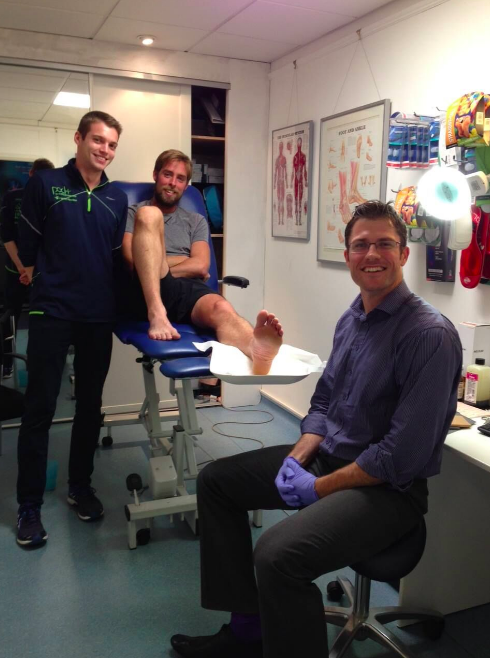
The reason for the initial shock at the prospect of crossing the finishing line comes later in the conversation – surprisingly late and expressed almost laughably casually.
“I broke my back on day 284,” he says, as if recalling dropping an iPhone. “I have a fractured vertebrae.” Back pain had been mounting for weeks, but Smith disregarded it until, disabled and contorted by agonising spasms, he limped into Aberdeen Royal Infirmary, unable to stand up straight.
“I said, ‘Just please help me.’ The lady who saw me looked at me and said, ‘You need to stop what you’re doing’. I broke down, burst into tears and said, ‘I can’t. I have this goal, so we need to work something out to help me achieve this.’”
Smith agreed to stop the challenge temporarily, to rest and seek treatment – at the time he still did not know that one of the bones in his back was fractured. But soon after he found a top physiotherapist who sent him to another hospital for an MRI scan, and not only was the fracture picked up, but the underlying cause.
“I was diagnosed with spondylolithesis,” he says. The condition describes the forward displacement of one of the vertebrae. When someone dies from hanging it is a particular kind of spondylolithesis – the second cervical vertebrae (C2) fracturing – that kills them. Smith’s is the L5 vertebrae; right at the bottom of the spine.
“All the running had caused the L5 to fracture, which in turn irritated the disc, which then bulged, impinging on the nerve, creating sciatic pain down my legs. But because I kept going…” He ran four marathons in this state. “…It got worse and worse and the whole core area of my body started to spasm, and that’s when my spine started to corkscrew.”
Smith took just 10 days off, during which he underwent more than 18 hours of physiotherapy. He describes the pain as more intense than anything he had experienced. But rather than taking it easy when he hit the road again, Smith and his team decided that in order to make up the time he would need to run super-marathons, adding distance to his daily 26.2 miles so he could still finish 401 marathons in 401 days.
It is no mystery to Smith what enabled him to ignore his body’s warnings and keep on running.
“You know,” he says softly, “I’ve sat on my bed and tried to take my life. You can’t get any worse than that. I got through that, so I feel like nothing can stop me. It’s not arrogance, it’s a true inner belief in who I am.”
All of which leads to a question he says he’s never been asked: What was harder, being in the closet, or running hundreds of marathons back-to-back? Smith pauses for a while, glancing down, weighing everything up.
“Being in the closet,” he says. “Not being able to be the person I am now.”
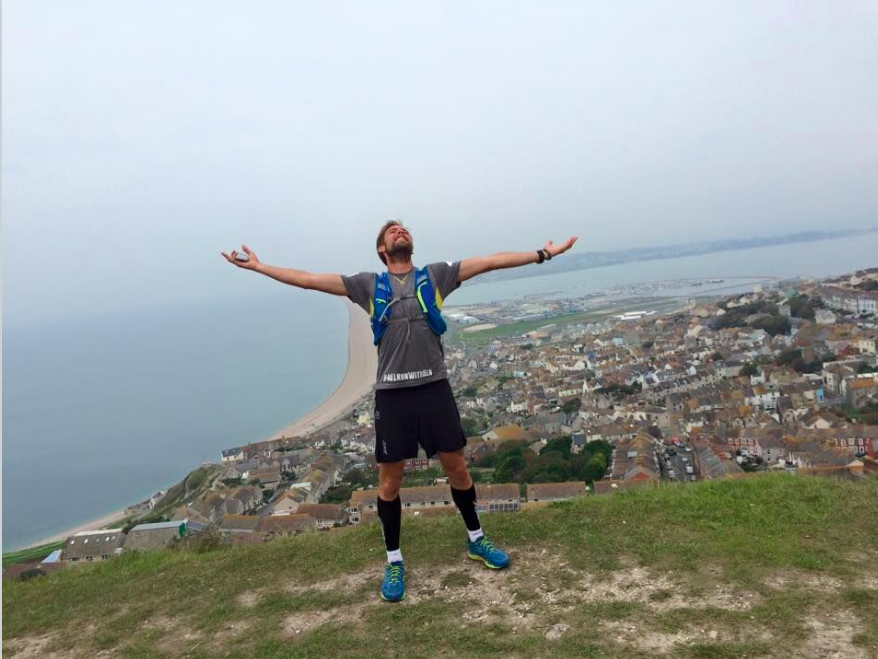
He takes himself back to his twenties. “I used to fantasise about having a happy relationship with a man, being in love – and now I am. I’m starting to have the life I wanted. I had to come to terms with who I was, and running was what helped me through that.”
What would he say to someone still in the closet?
“It’s dark – get out,” he says, before admitting, “I honestly don’t know. I would want to grab them and say, ‘Do you know what? You can be who you are and be happy,’ but they have to know that inside.” Equally, he says, if he could talk to his younger, bullied self, he would struggle to know what to say. “However, what I would say is talk to your mum and dad, because that was half the battle – I didn’t talk about it. It was shame.”
Smith is anxious about the end of the challenge, he says, because it is all he has focused on for so long. There are plans for a foundation to be set up to continue the anti-bullying work and the school visits, but nothing is fixed yet.
There is no doubt, however, what effect his efforts will have. “He has become a fantastic role model for young people across Britain," says Ruth Hunt, CEO of Stonewall. "His incredible fundraising efforts will allow us to continue our work with schools, ensuring that all young people are able to learn in a safe space where they are accepted without exception. We’re so grateful to Ben for everything.”
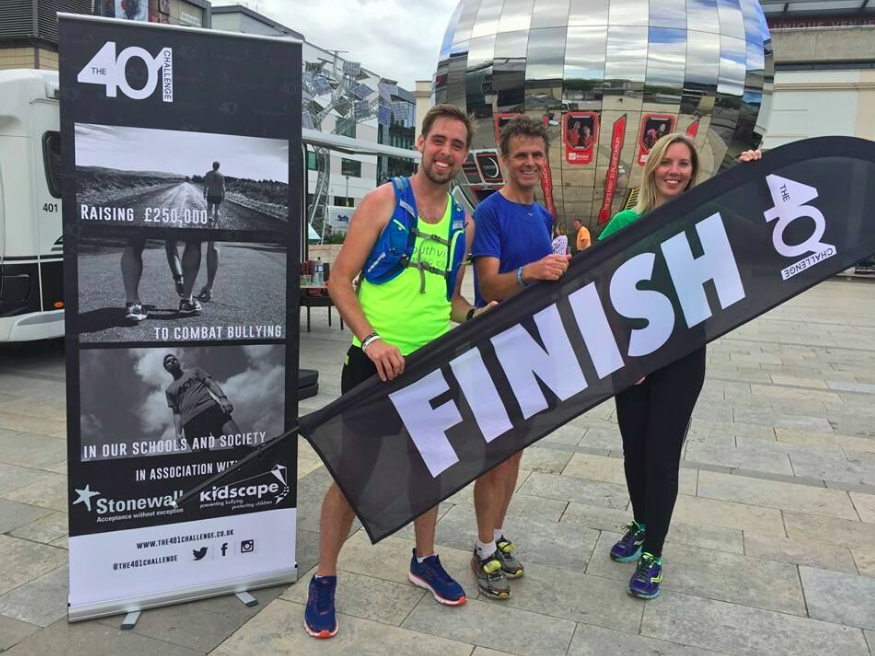
I wish him luck. I tell him to pat himself on the back and – thinking of all the kids that still suffer at school – I thank him. He looks sheepish, says thank you in return, and waves goodbye as the Skype camera cuts out.
Just after 4pm yesterday, ahead of schedule, Smith crossed the final finishing line in Bristol’s Millennium Square. As he told the crowds and assembled press that he had not only completed the 401 marathons in 401 days but also reached his £250,000 target, he popped the cork on a bottle of cider, sprayed it over his supporters and gulped it down – as cheers erupted.
